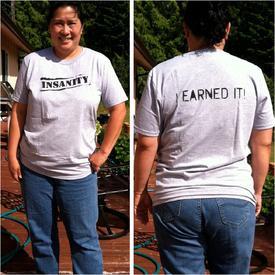Plyometrics

jcalicott
Posts: 103 Member
What is plyometrics? No really straight forward answers on google. what are the best exercises for plyo?
0
Replies
-
House of Pain summed up plyo
I came to get down, I came to get down
So get out your seats and jump around
Jump around, Jump around, Jump around
Jump up, jump up and get down.
Jump, jump, jump, jump0 -
House of Pain summed up plyo
I came to get down, I came to get down
So get out your seats and jump around
Jump around, Jump around, Jump around
Jump up, jump up and get down.
Jump, jump, jump, jump
LOL..my only experience with Plyo is when I did Insanity and I hated it..some of the hardest exercises I have ever done.0 -
Plyometrics, aka jump training.......explosive movements.
Controlled "recoil", followed by an explosive release.
Do a controlled squat and then proceed to jump straight up, and repeat..........that is plyometrics in its simplest form.
Another plyometrics move.......get in a plank position. Do a controlled push up move down to towards the ground, then pop up to where either both your hands or both your hands and both your feet leave the ground, and repeat.0 -
Basic plyometrics would be:
Jumping jacks
Burpees
Skaters
Box jumps
Those 4 alone are a great staple to learning plyos and can be intesified with either speed, duration or height
A.C.E. Certified Personal and Group Fitness Trainer
IDEA Fitness member
Kickboxing Certified Instructor
Been in fitness industry for 30 years and have studied kinesiology and nutrition0 -
I hate plyo! :grumble: but it is great for burning cals!
Jump squats, burpees, jumping lunges, moving pushups, leg burners etc Fun, Fun, Fun!0 -
So true!!House of Pain summed up plyo
What is the best way to track these? I use both MFP and also Endomondo. With E I can track only "aerobics", but with MFP there is normal aerobics and also intense aerobics. Is there any change MFP will roll out a straight "Plyometric" tracking set?
For anyone wondering I started out using this; STRONGER Month 1 Plyometric Workout: IGNITION0 -
Squat jumps are the death of me. But they must be done.0
-
What is the best way to track these? I use both MFP and also Endomondo. With E I can track only "aerobics", but with MFP there is normal aerobics and also intense aerobics. Is there any change MFP will roll out a straight "Plyometric" tracking set?
It's pretty impossible to give an estimate of what you'll burn doing plyos - it depends how hard you push yourself! your all-out max effort might be 10 cals/min, whereas another person doing the same workout might have the energy, strength & sheer will to push themselves to 16 cals/min or more. get a heart rate monitor if you want ANY comparative idea of how many calories you're burning. I still don't think HRMs are that accurate, so I just don't really care about my exercise "calories burned" because nothing is accurate. I just push myself HARD 4-5 days a week, eat enough cals, and watch the results happen. I do plyos in every workout - jumping is amazing for your butt. amazing. do 3 sets each of jumping switch lunges & jump squats to failure and then see how much fun stairs are the next few days!0 -
Plyometrics should be low rep and fully explosive - It's for power training not for calorie burns.
If you're bouncing around like a fool with sloppy form and trying to create a calorie deficit - you're doing something else, not plyo.
This is kinda the fault of DVD series like P90X calling things plyo which are basically jumping variations (it's kinda like the situation with "tabata" classes where the workout is 30 mins+). Using the word in the manner nowadays is pretty widespread in the US, but I urge anyone interested in actual plyometrics (i.e. Verkhoshansky's "shock" method) to check this out:
http://en.wikipedia.org/wiki/Plyometrics
Due to the speed of the reversal, there is a high CNS load associated with the practice. Hence the need for low-rep sets (especially if you are also incorporating other CNS taxing activities such as Back Squats and Deadlifts into your programme). Any movement that can be loaded with a short eccentric contraction and then reversed (really) quickly with a concentric one will probably do for a plyometric exercise, but depth jumps were the original movement.0
Categories
- All Categories
- 1.4M Health, Wellness and Goals
- 393.6K Introduce Yourself
- 43.8K Getting Started
- 260.3K Health and Weight Loss
- 175.9K Food and Nutrition
- 47.5K Recipes
- 232.5K Fitness and Exercise
- 430 Sleep, Mindfulness and Overall Wellness
- 6.5K Goal: Maintaining Weight
- 8.5K Goal: Gaining Weight and Body Building
- 153K Motivation and Support
- 8K Challenges
- 1.3K Debate Club
- 96.3K Chit-Chat
- 2.5K Fun and Games
- 3.8K MyFitnessPal Information
- 24 News and Announcements
- 1.1K Feature Suggestions and Ideas
- 2.6K MyFitnessPal Tech Support Questions








